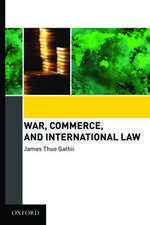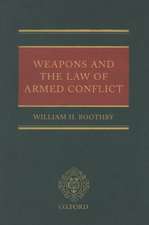Democracy goes to War: British Military Deployments under International Law
Autor Nigel Whiteen Limba Engleză Hardback – 18 iun 2009
Preț: 577.17 lei
Preț vechi: 735.46 lei
-22% Nou
Puncte Express: 866
Preț estimativ în valută:
110.44€ • 115.31$ • 91.40£
110.44€ • 115.31$ • 91.40£
Carte tipărită la comandă
Livrare economică 24-31 martie
Preluare comenzi: 021 569.72.76
Specificații
ISBN-13: 9780199218592
ISBN-10: 0199218595
Pagini: 332
Dimensiuni: 163 x 241 x 22 mm
Greutate: 0.64 kg
Ediția:New.
Editura: OUP OXFORD
Colecția OUP Oxford
Locul publicării:Oxford, United Kingdom
ISBN-10: 0199218595
Pagini: 332
Dimensiuni: 163 x 241 x 22 mm
Greutate: 0.64 kg
Ediția:New.
Editura: OUP OXFORD
Colecția OUP Oxford
Locul publicării:Oxford, United Kingdom
Recenzii
...a clear doctrinal narrative on a very sensitive issue of the use of military force and peacekeeping...White's current book provides a thorough insight from the British perspective on the participation of its troops in peacekeeping to a nation building operations, and how such decisions are made at a domestic level... This work skillfully uses the concept of democracy to generate an intellectual debate on political decision making related to deployment of troops and aspects of peace, security and the human rights that are linked to it within the international law...this book remains a valuable contribution to understand the British deployments around the world. White's book is a commendable pierce of research and a must read for academics, students and social scientists in the fields of law, politics, social science and security studies.
Notă biografică
Nigel D. White is Professor of International Law at the University of Sheffield. He has written a number of books, and many articles and essays on the law relating to the use of military force and peacekeeping.


















